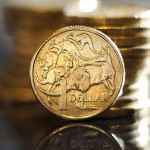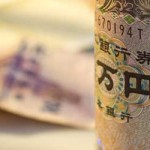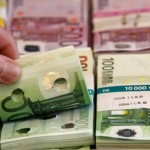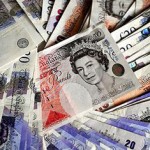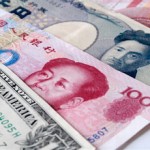Dollar Approaches 120 Yen on U.S. Growth as Aussie Falls 6th Day

The dollar strengthened to within 0.1 percent of 120 yen, the highest since July 2007, as analysts forecast that U.S. job growth will accelerate while Japan remains in recession.
A gauge of the U.S. currency headed for its highest close in more than five years. The euro was near a two-year low set yesterday amid speculation European Central Bank policy makers meeting today will signal additional stimulus. Australia’s dollar slid for a sixth day after Goldman Sachs Group Inc. forecast it would decline to 79 U.S. cents. A measure of currency volatility rose to the highest in almost 15 months.
“It’s still the divergent-growth, divergent-policy story,” said Robert Sinche, a global strategist at Amherst Pierpont Securities LLC in Stamford, Connecticut. “We are seeing capital flows out of Japan, and I think that helps bring capital out and continues this movement down in the yen.”
The dollar rose 0.1 percent to 119.92 yen at 2:01 p.m. in Tokyo after climbing to 119.95. The U.S. currency was little changed at $1.2305 per euro after appreciating to $1.2301 yesterday, the strongest since August 2012. The yen weakened 0.1 percent to 147.57 against the common currency.
U.S. employers added 230,000 workers last month after hiring 214,000 the previous month, according to a Bloomberg News survey of economists before tomorrow’s Labor Department report. Data today will show initial job claims dropped last week, a separate survey showed.
Highest Close
The Bloomberg Dollar Spot Index, which tracks the U.S. currency against 10 trading partners, gained 0.1 percent to 1,114.85, set for the highest close since March 2009. The gauge has increased 9.4 percent this year, set for the best annual gain since Bloomberg started compiling the data in 2004.
The ECB meets to set policy today after cutting interest rates to a record and starting purchases of asset-backed securities and covered bonds at previous gatherings. Further measures to revive growth may include buying sovereign bonds, President Mario Draghi said last month.
The premium on one-week options to sell the euro against the dollar climbed to the highest since Nov. 7 yesterday, according to data compiled by Bloomberg on 25-delta risk reversals. There was a premium to buy the single currency as recently as Nov. 21.
“The ECB is the only game in town, with the euro weak into the meeting” amid speculation there will be an announcement of some sort of additional stimulus, ANZ Bank New Zealand Ltd. analysts including senior currency strategist Sam Tuck in Auckland, wrote today in a note to clients.
‘Reflationary Policies’
The yen fell for a third day versus the dollar as Japanese newspapers including the Nikkei and Yomiuri reported Prime Minister Shinzo Abe’s Liberal Democratic Party will boost its majority at a Dec. 14 election, giving him a mandate to maintain policies that have weakened the currency.
“The papers say Abe will renew his mandate, and that means a continuation of his reflationary policies,” said Daisuke Karakama, chief market economist at Mizuho Bank Ltd. in Tokyo. “I wouldn’t be surprised to see dollar-yen break above 120 as soon as today.”
The yen has slumped 3.9 percent in the past month, the worst performer of 10 developed-nation currencies tracked by Bloomberg Correlation-Weighted Indexes. The euro declined 0.1 percent, while the dollar strengthened 2.1 percent.
JPMorgan Chase & Co.’s Global FX Volatility Index rose 0.4 percentage point yesterday to 9.48 percentage points, the highest level since September 2013.
Aussie Declines
The Aussie dropped to a four-year low after Goldman Sachs Australia Chief Economist Tim Toohey predicted it will slide to 83 cents in three months and 79 U.S. cents in the next year.
The median estimate of analysts surveyed by Bloomberg is for the currency to weaken to 82 cents at the end of 2015. Australia’s economic growth cooled to 0.3 percent in the third quarter, the Bureau of Statistics said yesterday, less than half the 0.7 percent pace predicted by economists surveyed by Bloomberg.
The Aussie fell 0.1 percent to 83.97 U.S. cents after dropping to 83.79 cents, the weakest level since July 2010.
Source: Bloomberg – Dollar Approaches 120 Yen on U.S. Growth as Aussie Falls 6th Day









